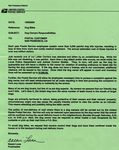 |
| Angelika/Mike Schilli |
|
Michael Living in America, you definitely see a lot more great deals to purchase stuff. A new PC from Dell with Intel 2.8 Ghz and 512MB RAM and 17 inch LCD screen for $575? No problem. However, such things are always only available for a few hours somewhere, often only online, and one would have to be constantly on the lookout to get wind of it.
Luckily, there are websites like slickdeals.net and dealcatcher.com, where volunteers scour around and report the latest special offers from competing stores. Does Dell have a coupon for a free printer, does Amazon have a Friday offer, or does the computer giant Comp-USA have a router that costs $17 and you get a $20 mail-in-rebate (see Rundbrief 01/1999)? You can find out on these sites. After reading it in the morning, you then have to decide quickly and order online, then you can get the most incredible deals. I have already bought 200GB hard drives for $59, wireless routers for $20 and, as I said, top-of-the-line computers with flat screens for $575.
No doubt: The stores sell these items at a loss. This is legal in the US. Of course, they expect customers to flock to the store or browse the website to order more than just the special offers.
But especially in Silicon Valley, a group of so-called "El Cheapos" has emerged, who rush into the stores on Saturday mornings to grab the bargain offers (and nothing else). And I know this from some colleagues who earn in the top 10 percent of the income scale -- it's just about the bargain.
Partially, you can see auctions on eBay offering items that were undoubtedly purchased from one of the supermarkets in Silicon Valley: If you look closely at the pictures, you can see original packaging with price tags from Silicon Valley retail giants like "Fry's". To redeem the mail-in rebate (Rundbrief 01/1999), the barcode has usually been removed from the packaging. Then, the eBay seller paid $20 for a DSL router at Fry's, received a $20 mail-in rebate from the manufacturer (Dlink, Belkin, Airlink), and then sells the item on eBay for $30 to a customer in South Dakota, who is happy to get it at that price. Everything 100% legal and a win-win situation for all consumers!
Moreover, it leads to a different buying behavior: People no longer buy a product because they need it, but because it is currently cheap. This of course keeps the economy going, which incidentally has recovered in the US since the recession and is on the brink of a new boom, and you're reading it here first!
For example, there is the website woot.com, a small startup company founded by a few immigrants from India to the USA, which offers one product per day and generates millions of dollars. The selection is completely crazy, one day it's a food processor, the other day a network router or a watch. The stuff is available as long as the stock lasts, then it's over for the rest of the day and the website just sits there idling. Until the next day, when the next Woot! Special offer goes on sale. By the way, the name of the company is derived from the phrase "Woot! There it is!", which can be translated as "Swoosh, there it is!".
Or take TiVo, as another example: On December 17th, 2004, they launched an advertising campaign. It was announced in papers that anyone who stood at a certain spot in Silicon Valley at 10am would get a digital video recorder worth $200 for free. The campaign was a huge success - thousands of people lined up and more than 1000 devices were given away. Helicopters from all the TV stations were there, newspaper reporters, the story was on everyone's lips and even some Yahoos skipped work until noon. When you consider how little publicity you'd get for $200,000 otherwise, it was a huge success.












